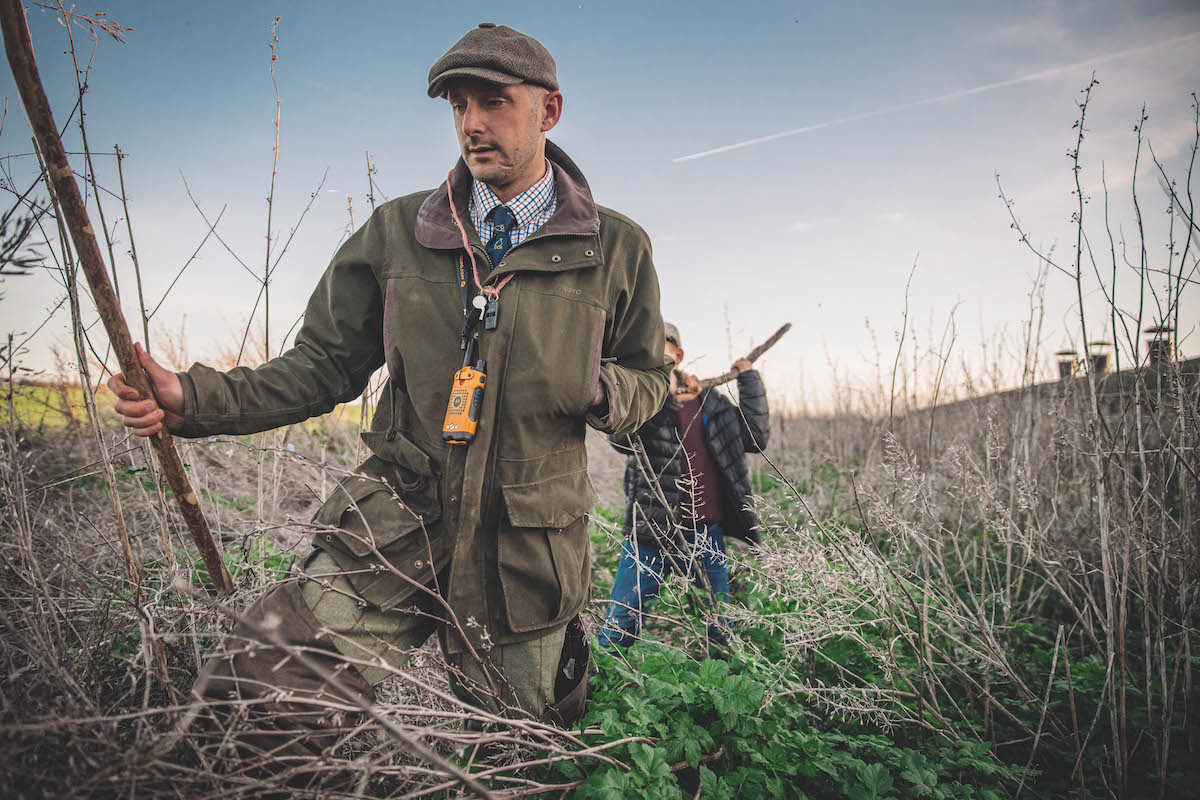What is a keeper today? What skills are needed?
Being able to stand your ground and remaining adaptable are essential to being a great gamekeeper in 2023, says Mark Fitzer

Of all the traits necessary in a modern keeper, commitment is perhaps the most important
What is a keeper?
At the end of the season past, I had a long conversation with a keeper who told me he wasn’t sure if he’s still a keeper at all. He runs two shoots and has an underkeeper, but he spends a lot of time selling shooting and dealing with clients. It was interesting because we both concluded that selling shooting can be part of the job. It can also encompass processing game and spearheading conservation, such as digging ponds or hedgelaying. It’s a role that’s always evolved and it always will. (Read a day in the life of a gamekeeper.)
Gamekeepers have to evolve or face extinction. While the job itself has changed dramatically in some areas, a lot of the attributes required to be a good keeper have stayed the same since my father’s day — and long before. But holding the title of gamekeeper doesn’t mean someone is any good at it — as with all professions, you have the top drawer and the also-rans. I have come across part-time keepers who are class acts, do fantastic work and put in a huge amount of effort. I have also seen professional keepers who aren’t fit to wash the boots of the former. (Read what does a gamekeeper do?)

The gamekeeping profession has changed in many ways, but in others has stayed much the same
Keeper commitment
Let’s talk about one thing that hasn’t changed in gamekeeping — commitment. You have to be committed, whatever type of shoot you work on. When you’re sitting at home having your tea and you can’t remember shutting that release pen gate or switching on that electric fence, it’s that commitment that nags you and you can’t rest until you’ve checked that everything’s OK.
When your poults are making a mass exodus over the boundary and you don’t want to go all the way back up there again, it’s that commitment that ensures you do. It could be the third night in a row that you’ve sat out for a fox you haven’t seen but you know it’s there and doing damage. Or those late-night checks on the rearing field when it’s pouring with rain and you would much rather go to bed than trudge back up there.
Adapt
That level of commitment is required as much today as it was 50 years ago. So what other attributes are needed to be a successful keeper in these strange and ever-changing times? The first thing I’d say is the ability to adapt. Just because you have always done something that way doesn’t mean it’s always going to keep working. On a lot of estates now there is a considerable amount of change taking place in the farming practices.
One thing that seems to be getting more and more popular is the use of green covercrops across many of the fields that are part of a regenerative farming programme. These can have a benefit for game from a holding point of view but that’s not necessarily a good thing if the birds are holding somewhere you don’t want them to be.
I’m not talking about a couple of acres of this stuff; I’m talking about vast areas of covercrops that spread the birds out and make them impossible to blank into a drive unless you have 100 beaters.
This is where you have to be adaptable. Perhaps the drive that the cover is having the most impact on is historically a morning drive but now, by the time you come to do it, the birds have already spread themselves out into the green cover. The drive that would usually have a good weight of game in it is light.
So perhaps this drive now has to done in the afternoon to catch the birds back in it when they are returning home from their day’s foraging. Or you might have to alter the feed pattern to allow the birds to feed in the afternoon. There may be many things you can do or there may not be, but the one thing you must do is something — not shrug your shoulders and say, “Oh well, it might be better next year.”
Keepers constantly need to adapt, whether it be due to forestry, agriculture, a change in weather patterns or the impact of the public. Whatever it is, the best keepers will assess, adapt and overcome.
One thing for sure is that, in this modern age of gamekeeping, we are very much in the public eye. Whether we like it or not, most people have an opinion of what we do — a lot of the time it is an uninformed one. So do we need to be ambassadors? I would suggest that we do. (Read does a gamekeeper really need a degree?)
There are some people who have the gift of the gab and are keen to get on social media platforms and promote the benefits of shooting and game management. This is fine and these people can often come across very well, so they could be considered great ambassadors for gamekeeping. But there are also a good number of keepers who diligently get on with their job out of the spotlight and consistently achieve excellent results. These gamekeepers are great ambassadors as well.

An important role is being an ambassador for shooting
It’s easy to preach to the converted and extol the benefits of game management to people who are already actively involved. But it’s more of a challenge to explain to someone whom you have just asked to put their dog on a lead or to get back on to the footpath they have strayed from.
People may take offence but there are times when, if you’re prepared to explain, they’re prepared to listen. You might not be able to change their mind but at least you can leave them better informed. We have to take the trouble to explain, if possible; we don’t have to justify what we do but we do need to take the chance to educate if the opportunity arises.
When I first started in the industry, rearing and releasing game was by no means easy — maximum effort and good stockmanship were still required — but it did seem more straightforward. If the chicks seemed a little ruffled, a drop of multivitamin would usually sort it or a bit of penicillin would straighten them up.
When the birds snicked (sneezed) in the pen, you grabbed the bottle of wormer and they would soon be back on track. While there were still more serious issues, they were few and far between. Now there is a multitude of issues waiting to exploit a lapse in hygiene or poor management practices or even just pure bad luck. And now there aren’t the products readily available to deal with these issues effectively.
Stockman
A good keeper in this modern age has to be an excellent stockman with the skills and knowledge to prevent an issue before it comes a problem. There must be top-class hygiene, monitoring the pH balance of the water, minimising stress — for the birds as well as the keeper — and creating a release pen environment where the birds can grow and flourish in relative safety. These are some of the things we can manage without what bad luck and the weather gods throw at us. The keeper who deals with released game needs to understand the requirements of his charges and must want to ensure the best possible start for them.
To succeed as a professional gamekeeper, you need to be very focused, but this level of focus must not be mistaken for a blinkered approach. We are custodians of the natural landscape and we must never lose sight of the larger picture. The efforts we undertake to improve our habitats for game must also improve the general flora and fauna that lives on the land we manage.
We must not lose sight of the fact that we are one piece of a large jigsaw. Excellent management techniques in regards to conservation will help to strengthen the modern keeper’s position as an integral part of countryside management.
Not that long ago on many estates, the shooting programme and the management of game was seen as one of the most important parts of the estate. The headkeeper’s word was law and woe betide anyone who was seen to have a potentially negative impact on the shooting programme.
Stubbles would be left and the farmer dare not plough a field without the headkeeper’s permission. At certain times of the year, the foresters were not even allowed to enter the coverts, let alone work in them. Those days are gone; the modern keeper must now realise he is only a cog in a part of a big machine.
Diplomacy
While it is important to fight your corner in order for the shoot to be successful, it is equally important to know when to concede. If you complain about everything, when there is something important to address no one will listen. Diplomacy is the best option, no matter how much you have to bite your lip.
Whether you are first-, second- or a third-generation gamekeeper it doesn’t matter, the ideal modern keepers will always be the ones with the ability to see the bigger picture and the ones who are prepared to go that extra mile to make things work.
To be a good keeper, you’ll have an understanding of the natural world, be open-minded but also extremely focused. But above all, you will have to have a good sense of humour, because the longer you work in this industry, the more you’ll need it.









